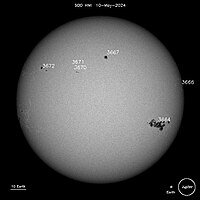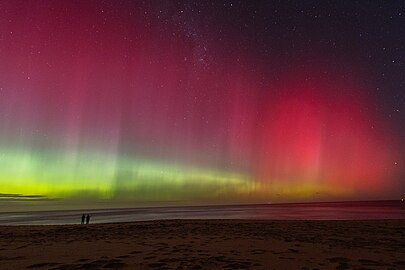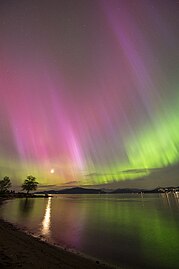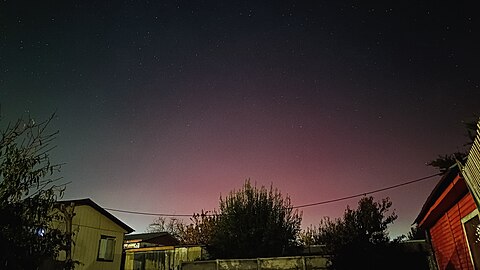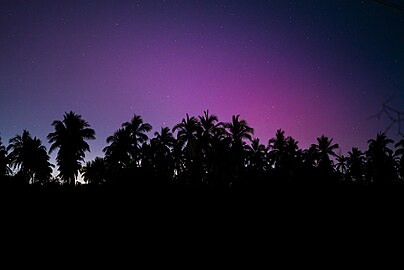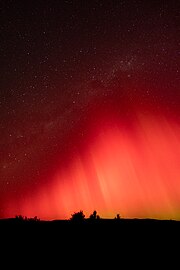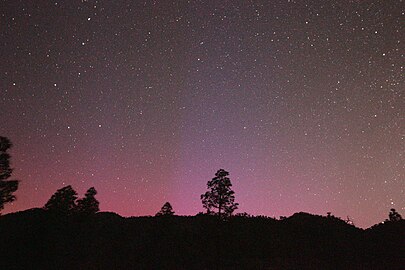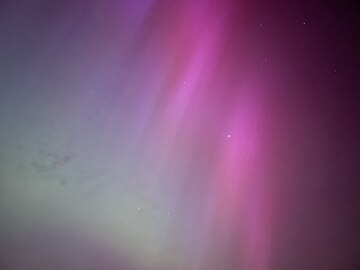2024年5月太阳风暴
 该太阳风暴引发的极光 | |
| 相关太阳活动区 | |
|---|---|
| NOAA耀斑区域no. | 13664 |
| 威尔逊山磁性分类法 | β-γ-δ |
| 最大耀斑(X射线) | X8.7 |
| R3 "强烈"无线电通信中断 | |
| R-标度 (NOAA/SWPC) | |
| 首次出现 | 2024-05-14 |
| 最大耀斑等级 | X8.7 |
| 影响 | 向阳面短波通讯受到干扰 |
| S3 "强烈"太阳质子事件 | |
| S-标度 (NOAA/SWPC) | |
| 最大值时间 | 2024-06-08 |
| 峰值p通量(≥ 10 MeV) | 1028 |
| G5 "极端" 地磁暴 | |
| G-标度 (NOAA/SWPC) | |
| 首次出现时间 | 2024-05-10 |
| 终结时间 | 2024-05-13 |
| 峰值Kp-值 | 9 |
| 峰值Ap-值 | 271 |
| 峰值地磁扰动指数 | −412 nT |
| 影响 | 全球定位系统信号中断或质量下降,卫星通讯中止 |
第25太阳周期的一部分 | |
2024年5月太陽風暴是2024年5月10日至13日第25太陽週期期間發生的一系列含有極端太陽耀斑,强烈的太阳质子事件和磁暴成分的強勁太阳风暴。這場地磁風暴是自2003年以來影響地球最強烈的一次,在南北半球的異常低緯度地區產生出極光[1][2]。
太陽耀斑和日冕物質拋射
[编辑]2024年5月8日,一個獲美國國家海洋和大氣管理局(NOAA)編號為13664(AR3664)的太陽活躍區域產生一個X1.0級和多個M級的太陽耀斑,並向地球進行幾次日冕物質拋射[3]。5月9日,活躍區產生出X2.25級和X1.12級太陽耀斑,每個耀斑均與全光暈日冕物質拋射相關[註 1]。5月10日,該區產生出一個X3.98級太陽耀斑,並於協調世界時5月11日凌晨1時23分又產生出另一個X5.4-5.7級太陽耀斑,並伴有另一次不對稱的全光暈日冕物質拋射[4][5][6]。該區還引發一場S1級太陽輻射風暴,那場風暴最高達到S2級[註 2][7]。5月14日,當最活躍的區域3664自轉超出太陽西緣時,產生出最強的太陽耀斑——X8.7級,導致R3級(強烈)的無線電收到阻塞[註 3][8]。
5月15日,耀斑區域AR3685在太陽的東側發射出X2.9級太陽耀斑,並在翌日引致地球出現G2級地磁風暴[9]。
磁暴
[编辑]
由於行星際磁場強度達到73nT(納特斯拉),地球磁軸的南向量達到-50nT,太陽風密度較高,太陽風速度在5月11日至12日(協調世界時)期間達到每秒750至800公里,被歸類為G5級地磁風暴(Kp = 9),使其成為自2003年萬聖節太陽風暴以來最強烈的風暴[10][11]。其餘幾次日冕物質拋射預計將於5月11日至12日抵達地球[12]。
與其他磁暴的比較
[编辑]地磁擾動指數(Dst指數)是一項測量太空天氣的標準。地磁擾動指數為負值時意味着地磁场正在減弱[13]。在太陽風暴期間尤其如此,地磁擾動指數的負數值越大,表示太陽風暴越強。
2003年萬聖節太陽風暴的最低地磁擾動指數為-383 nT,而2003年11月20日的另一場風暴達到-422 nT,但仍未達到G5級[14][15]。1989年3月磁暴的最低地磁擾動指數為-589 nT[16],而1921年5月磁暴估計的最低地磁擾動指數為-907±132 nT。1859年卡灵顿事件中的超級風暴其最低地磁擾動指數估計在-800 nT到-1750 nT之間[17]。
2024年5月太陽風暴的最低地磁擾動指數於5月11日達到-412 nT[18]。
極光觀測
[编辑]2024年5月8日發生的三次日冕物質拋射於5月10日到達地球,造成嚴重到極強的地磁風暴,並伴隨着明亮且非常持久的極光。
在北美洲,美國各地南至佛羅里達群島[19][20][21],以及墨西哥的尤卡坦半島[22]、巴哈馬[23]、牙買加[24]和波多黎各[25]等地都可以看見極光。夏威夷州也看到極光[26]。
歐洲各地南至葡萄牙[27]、西班牙[28]和意大利撒丁島[29]都可以看見極光。非洲阿爾及利亞和加那利群島也能看見極光[30][31]。
在亞洲,土耳其[32]、塞浦路斯[33]、伊朗[34]、日本[35]、印度北部[36]、大韓民國[37]以及华北地区[24]可以看到極光,包括乌鲁木齐[38]和北京[39]附近的地區。
在澳洲,北至昆士蘭州的汤斯维尔和麥凱都能看見極光[40][41],而在南半球的其他地區,新西蘭[42]、智利、阿根廷[43]、南非[44],以及北至的新喀里多尼亞[45]、烏拉圭、巴西南部[46]和納米比亞都能看見極光[44]。
雖然可以在全球許多地方透過相機看見極光,但在距離兩極較遠的地方,極光不太明亮,它們通常會顯得不飽和、消色差,甚至因為薄暮現象而令肉眼無法看見[47][48]。
自上次G5級磁暴(2003年)以來,相機技術有所改進,即使是標準手機相機也有足夠的靈敏度來捕捉極光的顏色[49]。因此,極光的相片在社交媒體上廣泛流傳,公眾在太陽風暴期間感到莫大興奮[50]。民眾能夠藉這次大規模記錄極光更深入地了解這種現象[49]。
影響
[编辑]由於風暴增加電離層D層的密度,傳播受干擾,它為地面廣播和雙向無線電通訊帶來負面影響,特別是對高頻段,對甚高頻和特高頻段的影響程度較低[51][52]。
在加拿大,卑詩水電公司和魁北克水電公司表示,他們已為這場風暴做好準備,並在5月10日至11日風暴噴射物襲擊地球時對其進行監測。與1989年的前一次太陽風暴導致魁北克省長達九小時的停電不同,當局並沒有收到由這次風暴造成停電的報導[53][54]。
在新西蘭,新西蘭輸電公司宣布進入電網緊急狀態,並停止一些輸電線路的服務以預防風暴[55]。
在中國大陸,国家空间天气监测预警中心在北京时间5月11日上午9時發佈地磁暴紅色預警,預料之後仍會出現高強度的地磁暴。中心表示中國大陸境內的電離層會受干擾,短波通信和導航定位會受到不同程度的影響。另外,高層大氣密度顯着增加,會導致低軌衛星軌道衰減加劇[56]。
在美國,電信公司AT&T和T-Mobile表示,他們已準備好應對網路中斷,但由於網路依賴的頻率與受干擾影響的高頻段不同,因此預計電訊服務不太可能受到重大影響[57]。美國國家海洋和大氣管理局報告指,電網存在不規則現象,全球定位系統和高頻無線電通訊性能有所下降[58],聯邦緊急事務管理署和美國能源部均報告指,風暴對當地人口沒有重大影響[59]。
约翰迪尔、即時運動定位、全球定位系統設備的農業用戶報告指,在磁暴期間,位置精確度明顯下降。由於精準農業使用全球定位系統接收器引導拖拉機,部分農業工人被迫完全暫停種植活動[60][61]。
維多利亞大學研究人員發現,地磁風暴觸發部署在海面下2.7公里深處的海底觀測站中的指南針[62]。
一些在暴風雨期間飛行的無人機出現異常行為,包括難以保持一個穩定的懸停、全球定位系統訊號中斷,以及在某些情況下突然失控導致墜機[63][64]。無人機在飛行過程中依靠全球定位系統和磁訊號來保持位置,而這些訊號會受到地磁活動影響。
協調世界時5月13日凌晨0時19分,GOES-16衛星(位於GOES東側位置,主要運行對地靜止氣象衛星,提供以美洲為中心的視圖)停止傳輸所有資料。近兩小時後GOES-16衛星恢復資料傳輸[65]。此後不久,該衛星出現第二次資料傳輸遺失,從凌晨3時19分到凌晨3時30分持續了11分鐘[66]。
其他對衛星服務的影響包括星链的低軌道衛星群,由於本次太陽風暴的強度極高,這些衛星的服務質素有所下降,但仍能維持運作[67][68][69]。
图集
[编辑]在全世界多地,即使是遠離磁極的地區都可以看見極光。以下圖片庫是在5月10日至11日夜間所拍攝的極光。
注释
[编辑]- ^ 一个X1.7级太陽耀斑意味着一个太阳耀斑通过静止环境观测卫星(GOES)在地球附近测量到的X射线峰值通量(波长在100至800皮米之间)达到了1.7×10−4W/m2,而一个M5级太陽耀斑则为5×10−5W/m2。
- ^ S1级太陽輻射風暴指带电粒子粒子通量达到了10MeV,S2级太陽輻射風暴指带电粒子通量达到了102MeV。S2事件可能会对卫星的信号传输有一定影响,电离层的影响可能致使高频通讯的短暂丧失且对极地高层飞行的飞机乘客与航天员有略高的电离辐射影响。详见NOAA分类。
- ^ R3级可能致使高频无线电通信的广域中断,在地球受阳光照射的一侧失去无线电通讯大约一个小时,亦可致使低频导航信号退化约一小时。一般来说需要一个X1级以上的太阳耀斑。详见NOAA分类。
參見
[编辑]外部链接
[编辑]- 活动区13664的演化及其影响(英語)
参考来源
[编辑]- ^ Miller, Katrina; Penn, Ivan; Lindner, Emmett. Northern Lights Set to Return During Extreme Solar Storm's 2nd Night – Electrical utilities said they weathered earlier conditions as persistent geomagnetic storms were expected to cause another light show in evening skies.
 . The New York Times. 2024-05-11 [2024-05-12]. (原始内容存档于2024-05-12).
. The New York Times. 2024-05-11 [2024-05-12]. (原始内容存档于2024-05-12).
- ^ Ralls, Eric. Auroras expected all weekend across the U.S. as massive solar storm hits Earth. Earth.com. 2024-05-10 [2024-05-11]. (原始内容存档于2024-05-11) (英语).
- ^ Sunspot region 3664, major flares and CMEs!. SpaceWeatherLive. 2024-05-08 [2024-05-11]. (原始内容存档于2024-05-09).
- ^ Sunspot region AR13664. SpaceWeatherLive. [2024-05-11]. (原始内容存档于2024-05-11).
- ^ CME impact imminent, Two more earth-directed CMEs. SpaceWeatherLive. 2024-05-10 [2024-05-11]. (原始内容存档于2024-05-10).
- ^ Yet Another X-class Flare!. Space Weather Prediction Center. National Oceanic and Atmospheric Administration. 2024-05-11 [2024-05-11]. (原始内容存档于2024-05-11).
- ^ Solar Photons archive, 10 May 2024. Space Weather Live. 2024-05-10 [2024-05-11]. (原始内容存档于2024-05-12).
- ^ Region 3664 not done yet! Produces X8.7 flare...largest of the solar cycle!. Space Weather Prediction Center. US National Oceanic and Atmospheric Administration. [2024-05-15]. (原始内容存档于2024-05-15).
- ^ Garofalo, Meredith. Here we go again — new sunspot regions emerge, strong solar flare recorded. Space.com. 2024-05-17 [2024-05-18]. (原始内容存档于2024-05-18) (英语).
- ^ Strongest geomagnetic storm since 2003, X5.8 solar flare. SpaceWeatherLive. 2024-05-11 [2024-05-11]. (原始内容存档于2024-05-11).
- ^ Viewing archive of Saturday, 11 May 2024 Solar wind (Speed, Density), Interplanetary Magnetic Field (IMF) (Bt, Bz). SpaceWeatherLive. [2024-05-13]. (原始内容存档于2024-05-13).
- ^ SWPC Issues Its First G4 Watch Since 2005. Space Weather Prediction Center. 2024-05-09 [2024-05-11]. (原始内容存档于2024-05-10).
- ^ Abduallah, Yasser; Wang, Jason T. L.; Bose, Prianka; Zhang, Genwei; Gerges, Firas; Wang, Haimin, A Deep Learning Approach to Dst Index Prediction, 2022-05-05, arXiv:2205.02447

- ^ Let's compare! Halloween 2003 VS May 2024 Solar Storms!. SpaceWeatherLive. 2024-05-17 [2024-05-18]. (原始内容存档于2024-05-17).
- ^ Top 50 geomagnetic storms of 2003. SpaceWeatherLive. [2024-05-18]. (原始内容存档于2024-05-11).
- ^ Boteler, D. H. A 21st Century View of the March 1989 Magnetic Storm. Space Weather. 2019-10-10, 17 (10): 1427–1441. Bibcode:2019SpWea..17.1427B. ISSN 1542-7390. doi:10.1029/2019SW002278
 (英语).
(英语).
- ^ Near Miss: The Solar Superstorm of July 2012. NASA Science. [2024-05-11]. (原始内容存档于2024-05-11) (美国英语).
- ^ Real-time Dst Index. World Data Center for Geomagnetism, Kyoto. [2024-05-11]. (原始内容存档于2024-05-10).
- ^ Miller, Katrina; Jones, Judson. Solar Storm Intensifies, Filling Skies With Northern Lights. The New York Times. 2024-05-10 [2024-05-11]. (原始内容存档于2024-05-11).
- ^ Fritz, Angela; Hammond, Elise; Lau, Chris. Live updates: The latest on the massive solar storm. CNN. 2024-05-10 [2024-05-11]. (原始内容存档于2024-05-11).
- ^ 'Unbelievable!': Northern Lights seen in South Florida from 'severe' solar storm. NBC 6 South Florida. Associated Press. 2024-05-11 [2024-05-11]. (原始内容存档于2024-05-11).
- ^ Auroras boreales por primera vez en Yucatán [Aurora borealis for the first time in Yucatán]. Tribuna Campeche. 2024-05-11 [2024-05-12]. (原始内容存档于2024-05-12) (西班牙语).
- ^ Northern Lights Likely To Illuminate Night Sky Again Amid "Extreme" Solar Storm. NDTV.com. [2024-05-13]. (原始内容存档于2024-05-12).
- ^ 24.0 24.1 严茂强. Stunning red sky over China wins fans online. www.chinadaily.com.cn. [2024-05-19]. (原始内容存档于2024-05-15).
- ^ Garofalo, Meredith. How a giant sunspot unleashed solar storms that spawned global auroras that just dazzled us all. Space.com. 2024-05-13 [2024-05-15]. (原始内容存档于2024-05-15) (英语).
- ^ Schenfeld, Nikki. Northern lights seen in Hawaii! First time in over a century. KHON2. 2024-05-12 [2024-05-13]. (原始内容存档于2024-05-12) (英语).
- ^ Hughes, Tobi. Northern lights visible in the skies of Portugal. Madeira Island News Blog. 2024-05-11 [2024-05-13]. (原始内容存档于2024-05-14) (英语).
- ^ Ortiz, Marina. La tormenta geomagnética más fuerte de los últimos 20 años provoca una gran aurora boreal visible en toda España [The strongest geomagnetic storm of the past 20 years causes a great aurora borealis visible in all of Spain]. ABC Ciencia. Diario ABC, S.L. 2024-05-11 [2024-05-12]. (原始内容存档于2024-05-12) (西班牙语).
- ^ Onano, Giorgio Ignazio. The Northern Lights color the Sardinian night: the show from the north to the south of the island. L'Unione Sarda English. 2024-05-11 [2024-05-19]. (原始内容存档于2024-05-19) (英语).
- ^ Due to the solar storm, and in a historical precedent, the northern lights were seen from Algeria and areas on the equator. www.arabiaweather.com. [2024-05-15]. (原始内容存档于2024-05-20) (英语).
- ^ Canary Islands witness the spectacle of the Northern Lights. Canarian Weekly. 2024-05-11 [2024-05-13]. (原始内容存档于2024-05-14) (英语).
- ^ Auroras over Turkey's northern coasts. bianet.org. [2024-05-19]. (原始内容存档于2024-05-17) (英语).
- ^ Northern Lights captured for first time over Cyprus in rare event, Kitasweather says [VIDEO]. in-cyprus.philenews.com. 2024-05-13 [2024-05-13]. (原始内容存档于2024-05-11) (英语).
- ^ Explaining the Historical Geomagnetic Storm of 10th May 2024 – The Day Earth Lit Up with Red Auroras. Whistling Hound. 2024-05-13 [2024-05-19]. (原始内容存档于2024-05-19) (英语).
- ^ 石倉徹也. 太陽フレアの影響、各地でオーロラ出現 日本で見られるのは緑か赤か. 朝日新聞. 2024-05-11 [2024-05-12]. (原始内容存档于2024-05-11) (日语).
- ^ Sengupta, Trisha. Aurora illuminates sky in Ladakh's Hanle as extreme solar storm hits Earth: 'Extraordinarily beautiful'. Hindustan Times. 2024-05-11 [2024-05-12]. (原始内容存档于2024-05-11).
- ^ [천문연 참고자료] 천문연 망원경 및 한국에서 촬영한 오로라 사진. Korea Astronomy and Space Science Institute. 2024-05-13 [2024-08-21] (韩语).
- ^ 乌鲁木齐草原夜空现粉色极光 “来自太阳浪漫”特大地磁暴. 天山网. 2024-05-12 [2024-05-13]. (原始内容存档于2024-05-13).
- ^ 鄭寧. 低緯北京驚現紫紅色絕美極光 與長城交相輝映 專家解釋罕見奇景. 香港01. 2024-05-13 [2024-05-17]. (原始内容存档于2024-05-17).
- ^ Southern lights shock stargazers in Townsville. Townsville Bulletin. [2024-05-18]. (原始内容存档于2024-05-20) (澳大利亚英语).
- ^ Media Releases - Bureau of Meteorology Newsroom. media.bom.gov.au. [2024-05-13]. (原始内容存档于2024-05-12).
- ^ Incredible photos: Stunning aurora dazzles NZ skies. NZ Herald. 2024-05-11 [2024-05-11]. (原始内容存档于2024-05-11) (英语).
- ^ Aurora Austral impresiona en los cielos del sur de Chile [Aurora Australis impresses in the skies of southern Chile]. MSN. 2024-05-11 [2024-05-11]. (原始内容存档于2024-05-12) (西班牙语).
- ^ 44.0 44.1 Iderawumi, Mustapha. Southern African Skies Light Up with Aurora as Historic Solar Storm Collides with Earth. Space in Africa. SANSA. 2024-05-11 [2024-05-11]. (原始内容存档于2024-05-12).
- ^ Mack, Eric. Epic Northern Lights Aurora This Month Tied To A Solar 'Great Storm'. Forbes. [2024-05-19]. (原始内容存档于2024-05-19) (英语).
- ^ Cielo rojo: el extraño fenómeno de la aurora austral que se pudo ver en Uruguay [Red sky: the strange phenomenon of the aurora australis that could be seen in Uruguay]. Telenoche. 2024-05-11 [2024-05-12]. (原始内容存档于2024-05-11) (西班牙语).
- ^ Why your camera sees the night sky better than your eyes. Akari Photo Tours. [2024-05-19]. (原始内容存档于2024-05-18).
- ^ Mack, Eric. To See The Northern Lights Aurora This Weekend, Use Your Phone Camera. Forbes. [2024-05-19]. (原始内容存档于2024-05-16) (英语).
- ^ 49.0 49.1 Johnson-Groh, Mara; NASA. How NASA tracked the most intense solar storm in decades. phys.org. [2024-05-17]. (原始内容存档于2024-05-17) (英语).
- ^ AHMED, Issam. First 'extreme' solar storm in 20 years brings spectacular auroras. phys.org. [2024-05-17]. (原始内容存档于2024-05-17) (英语).
- ^ Ralls, Eric. 'Extreme' and very rare G5-level solar storm hits Earth on Saturday. Earth.com. 2024-05-11 [2024-05-11]. (原始内容存档于2024-05-11) (英语).
- ^ Persons, Mark. What I Heard During the Solar Event. Radio World. 2024-05-13 [2024-05-14]. (原始内容存档于2024-05-14).
- ^ Major solar storm hits Canada, bringing risks and aurora, B.C. Hydro monitoring. Vancouver Sun. The Canadian Press. 2024-05-10 [2024-05-12]. (原始内容存档于2024-05-11).
- ^ Solar storm spares province of any power outages, Hydro-Québec says. The Gazette (Montreal Gazette). La Presse Canadienne. 2024-05-10 [2024-05-12]. (原始内容存档于2024-05-12).
- ^ Solar storm: Transpower extends grid emergency declaration. 1 News. [2024-05-11]. (原始内容存档于2024-05-12) (英语).
- ^ 国家空间天气监测预警中心发布地磁暴红色预警. 央视网. 2024-05-11 [2024-05-13]. (原始内容存档于2024-05-31).
- ^ Sutton, Joe; Smart, Sara. AT&T and TMobile say they ready to respond to any impacts from geomagnetic storm. CNN. 2024-05-10 [2024-05-12]. (原始内容存档于2024-05-11).
- ^ G5 Conditions Reached Yet Again!. Space Weather Prediction Center. Boulder, CO: National Oceanic and Atmospheric Administration. 2024-05-11 [2024-05-12]. (原始内容存档于2024-05-11).
- ^ Krisher, Tom; Funk, Josh; Dunn, Marcia. Solar storm puts on brilliant light show across the globe, but no serious problems reported. apnews.com. The Associated Press. 2024-05-11 [2024-05-11]. (原始内容存档于2024-05-12).
- ^ Koebler, Jason. Solar Storm Knocks Out Farmers' Tractor GPS Systems During Peak Planting Season. 404 Media. 2024-05-12 [2024-05-12]. (原始内容存档于2024-05-12) (英语).
- ^ Davis, Wes. Solar Storms are disrupting farmer GPS systems during critical planting time. The Verge. 2024-05-12 [2024-05-13]. (原始内容存档于2024-05-12).
- ^ Northern Lights affected University of Victoria's deep sea observatories. 2024-05-16 [2024-05-16]. (原始内容存档于2024-05-16).
- ^ Geomagnetic Storm Watch. DJI Mavic, Air & Mini Drone Community. 2024-05-10 [2024-05-13]. (原始内容存档于2024-05-14) (美国英语).
- ^ bluereptile. $3k down the drain. r/dji. 2024-05-12 [2024-05-13]. (原始内容存档于2024-05-13).
- ^ Correction: Length of the Outage/Event. www.ospo.noaa.gov. [2024-05-13]. (原始内容存档于2024-05-13).
- ^ Topic: GOES-16 All Products and derived products delivered to AWIPS, GRB, PDA. www.ospo.noaa.gov. [2024-05-13]. (原始内容存档于2024-05-13).
- ^ Shetti, Utkarsh. Williams, Alison; Mark, Potter , 编. Musk's Starlink satellites disrupted by major solar storm. Reuters. 2024-05-11 [2024-05-11]. (原始内容存档于2024-05-13).
- ^ Musk, Elon [@elonmusk]. Major geomagnetic solar storm happening right now. Biggest in a long time. Starlink satellites are under a lot of pressure, but holding up so far. (推文). 2024-05-11 [2024-05-11] –通过Twitter.
- ^ SpaceX [@SpaceX]. All @Starlink satellites on-orbit weathered the geomagnetic storm and remain healthy (推文). 12 May 2024 [25 May 2024] –通过Twitter.

